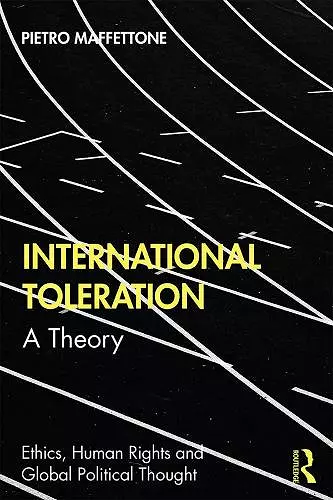International Toleration
A Theory
Format:Paperback
Publisher:Taylor & Francis Ltd
Published:19th Mar '20
Should be back in stock very soon
This paperback is available in another edition too:
- Hardback£145.00(9780367442514)

This book proposes a theory of toleration wherein liberal democracies peacefully co-exist with non-democratic societies. It conceptualises international toleration in a way that is both faithful to the liberal tradition and at the same time explains why we should accept some nonliberal and non-democratic political communities as members in good standing in international society.
The volume delves into different theoretical understandings of the idea of toleration and what it has come to mean in today’s highly polarised world. It argues that classifying states as liberal and nonliberal is important but cannot explain how they should relate to one another. Putting forward a new reconstruction of Rawls’s theory of political liberalism, Maffettone makes a compelling case for the claim that the separation between domestic and international political domains can enable a liberal state to have equal respect and recognition for at least some nonliberal ones.
A major intervention in political and legal philosophy, this book will be indispensable to students and teachers of political theory, international relations, peace and conflict studies, international law, and human rights. It will also be of interest to government think tanks and civil servants.
"Liberal toleration seems increasingly under threat – both within nations and between them. Under these circumstances, work such as that of Pietro Maffetone becomes increasingly important. Maffetone provides a compelling and elegant defense of a particular vision of liberal tolerance; his account of toleration is capable of guiding liberal states seeking to identify those foreign political practices they are duty-bound to respect – as well as those they are rightly permitted to reject. The book draws on the history of liberal thought about toleration, while demonstrating the ways in which that history must be reinterpreted to make sense of modern international controversy. The book is rigorous, clear, and very likely right; it deserves to be taken seriously by political philosophers and political practitioners alike." — Michael Blake
"Since the publication of Rawls’s book, Political Liberalism, two questions have been central to the development of liberal political philosophy: how can a liberal political order be justified, given the pluralism that characterizes liberal societies; and how ought a liberal society to regard other societies that are not liberal? In this book, Pietro Maffettone makes an important contribution to answering the second question. Building on a novel interpretation of Rawls’s idea of toleration of nonliberal, but "decent" societies, Maffettone develops a methodologically sophisticated and plausible account of what we should expect of the people of nonliberal societies if they are to warrant our toleration. Further, he demonstrates that toleration is not just a matter of "putting up" with those you regards as inferior, but a positive affirmation of equal respect." — Allen Buchanan
'Liberal toleration seems increasingly under threat – both within nations and between them. Under these circumstances, work such as that of Pietro Maffettone becomes increasingly important. Maffettone provides a compelling and elegant defense of a particular vision of liberal tolerance; his account of toleration is capable of guiding liberal states seeking to identify those foreign political practices they are duty-bound to respect – as well as those they are rightly permitted to reject. The book draws on the history of liberal thought about toleration, while demonstrating the ways in which that history must be reinterpreted to make sense of modern international controversy. The book is rigorous, clear, and very likely right; it deserves to be taken seriously by political philosophers and political practitioners alike.' — Michael Blake, Professor of Philosophy, Public Policy, and Governance, Department of Philosophy and Daniel J. Evans School of Public Policy and Governance, University of Washington, USA
'Since the publication of Rawls’s book, Political Liberalism, two questions have been central to the development of liberal political philosophy: how can a liberal political order be justified, given the pluralism that characterizes liberal societies; and how ought a liberal society to regard other societies that are not liberal? In this book, Pietro Maffettone makes an important contribution to answering the second question. Building on a novel interpretation of Rawls’s idea of toleration of nonliberal but "decent" societies, Maffettone develops a methodologically sophisticated and plausible account of what we should expect of the people of nonliberal societies if they are to warrant our toleration. Further, he demonstrates that toleration is not just a matter of "putting up" with those you regards as inferior, but a positive affirmation of equal respect.' — Allen Buchanan, Research Professor of Philosophy at the University of Arizona; James B. Duke Distinguished Professor Emeritus of Philosophy at Duke University, USA
ISBN: 9780367442521
Dimensions: unknown
Weight: 276g
176 pages